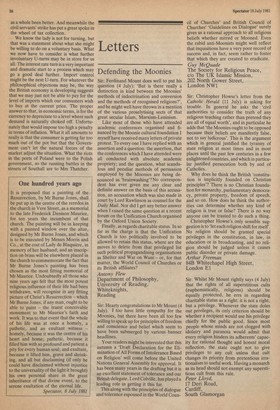Sir: Christopher Howse's letter from the Catholic Herald (11 July)
is asking for trouble. In general he asks the 'civil authorities to consider the truth of any religious teaching rather than pretend they are all of equal worth', and in particular he adds that 'the Moonies ought to be opposed because their beliefs are manifestly false, not to say ludicrous'. This is the argument which in general justified the tyranny of state religion at most times and in most places until the past few centuries in a few enlightened countries, and which in particular justified persecution both by and of Catholics.
Why does he think the British 'constitution is implicitly founded on Christian principles'? There is no Christian foundation for monarchy, parliamentary democracy, private property, freedom of speech, and so on. How does he think the authorities can determine whether any kind of religion is true or false? There is no way anyone can be trusted to do such a thing.
Christopher Howse's only sensible suggestion is to let each religion shift for itself. No religion should be granted special privileges in the constitution, in law, in education or in broadcasting, and no religion should be judged unless it causes public disorder or private damage.
Arthur Freeman 84B Whitechapel High Street, London El


































 Previous page
Previous page